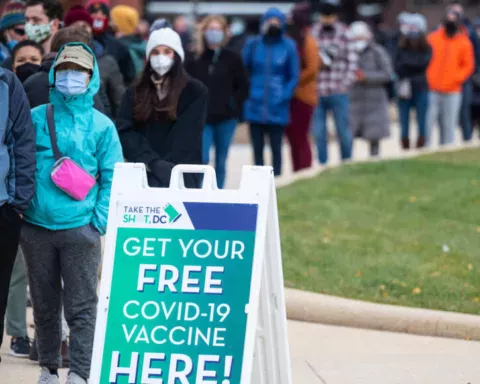My book The Butterfly Defect shows why globalization creates systemic risks. It also shows why stopping globalization will not stop global threats but rather will amplify them. There is no wall high enough to keep out climate change, pandemics, and other catastrophic risks. But high walls undermine the potential for cooperation required to manage our shared risks. Protectionism reduces investment, trade, tourism, and technological advances, which create jobs and higher incomes, reducing the capacity of countries to build resilience. The solution is in working together to make globalization safe and sustainable, not in working against each other.
Leadership is required to manage the negative dimensions of globalization and harvest the positive, to ensure progress is not overwhelmed by common threats. Resilient systems are only as strong as their weakest links. Stopping the next pandemic, which could be even worse than COVID-19, must be a priority. This requires reinforcing and reforming the World Health Organization (WHO) to give it the governance, staff, and capacity it needs to be the world’s rapid-response fighting force on global health.
In recent decades, globalization has led to revolutionary changes that have outstripped the slower evolution of institutions, causing a widening gap between our increasingly complex systems and our methods for managing their risks. As we saw with the financial crisis and now with COVID-19, systemic risks can quickly overwhelm processes that previously appeared robust. While there is no doubting the pandemic threat, the slower-moving but accumulating dangers posed by climate change require equally concerted action.
The pandemic has highlighted our lack of immunity to natural threats, but also created an opportunity to reset our economies. There is no shortage of ideas regarding green stimulus policies, which offer the potential to build back better and accelerate the transition from fossil fuels. Global protests, from climate to race, have demonstrated the appetite for fresh thinking. And COVID-19 has also demonstrated that citizens are prepared to change their behavior when required to do so. All that remains is for governments to act.
Networked solutions needed
COVID-19 has highlighted the pressing need for better global risk management. So too has escalating climate change. As did the financial crisis. Urgent reform is required to tame the butterfly defect of globalization.
These networked threats require changes in all parts of the system. Action must begin with us as individuals changing our behavior—for example by wearing masks and weaning ourselves off fossil fuels. Resilience cannot be delegated to others. It is everyone’s responsibility. Firms should value a prudent level of spare working capital as a valuable investment in resilience, not just as excess fat to be trimmed to maximize leverage. Minimizing the amount of capital or spare capacity tied up through just-in-time or lean management systems can undermine resilience. Regulators should note the lessons from the Eyjafjallajökull volcano, the Tohoku tsunami, Hurricanes Katrina to Maria, and now COVID-19—that widespread leanness can multiply into systemic fragility.
Our financial, digital, trade, and other systems are intertwined through complex networks. The intersecting nodes and hubs are concentrated in specific locations, such as global financial centers and major ports and airports. The concentration of logistic or other nodes in one location makes them vulnerable, as does the concentration of key personnel and information in headquarters buildings. Resilience can be enhanced by greater geographic diversification, but its benefits have not yet found their way into competition policy or risk management strategies.
A growing number of shareholders and managers of forward-looking firms have expressed their desire to improve their companies’ resilience to systemic shocks. And politicians are similarly keen to improve the resilience of the public sector. Although welcome, this requires deeper analysis, including to determine how much resilience, and to what; firms and governments do not have the financial or other resources to insulate themselves totally from all possible shocks.
Resilience can be improved by decentralization, so that individuals, businesses, and countries are empowered to make their own decisions. The principle of subsidiarity is, however, a complement not a substitute for higher levels of authority. Overarching principles are necessary for risk management, and for global systemic risks. This requires that countries yield some autonomy to supranational institutions. Countries that have assiduously followed the guidelines of the WHO have done best, whether they are relatively poor, such as Vietnam, or richer, such as Canada. Stark differences in the management of COVID-19 have demonstrated the importance of operating at multiple levels to contain risk and that robust international, national, subnational, and local actions are required.
Multilateral institutions should be at the apex of this layered approach. Yet there remains a set of orphan issues with no institutional home. A number of international agencies provide analysis and information on climate change, such as the International Panel on Climate Change. But there is no global institution with decision-making and enforcement power to coordinate responses. There also is no major global organization working on cybercrime, even though a single computer virus, such as WannaCry or NotPetya—whether produced by organized state agencies or lone-wolf individuals—can spread globally and cause billions of dollars of damage within days. This threat, like that of extremist ideologies and the subversion of democracy or vaccination campaigns through fake news, is spread opportunistically through the digital networks of globalization. While these threats transcend national borders, as do the threats posed by climate change, pandemics, and terrorism, current responses are predominantly national (or regional, in the case of the European Union).
Significant progress can still be made using the Pareto principle (which states that 80 percent of consequences come from 20 percent of causes), since a small set of actors can usually resolve a large part of any problem. And those that contribute the greatest share of the problem have the greatest responsibility to resolve it. A small number of countries and companies account for well over two-thirds of carbon emissions. New York state accounts for more carbon emissions than 45 African countries. It also consumes more antibiotics than all these nations combined. As the Oxford Martin Commission for Future Generations report “Now for the Long Term” argues, a C20-C30-C40 partnership of the largest countries, companies, and cities would include enough key players to make a significant difference in addressing climate change. The success of coalitions that emerged to tackle ozone depletion or reverse the tide of HIV/AIDS provides inspiring insight into the ability of coalitions of committed citizens, companies, and countries to make a difference, bolstering the efforts of the United Nations and multilateral institutions.
Global governance in the 21st century
Multilateral institutions can only be as effective as their shareholders allow. In response to the COVID-19 crisis, the IMF has streamlined its processes and provided unprecedented support for its members. But not all institutions have been able to rise to the challenge, and developing economies remain in dire need of additional multilateral support. The WHO should be the world’s rapid-response force on global health but has been undermined just when it is needed most. And while global trade could use a shot in the arm, the effectiveness of the World Trade Organization is stymied by trade wars and the blocking of much-needed appointments and reforms.
China-centered institutions are becoming increasingly important, including the Asian Infrastructure Investment Bank and the constellation of bilateral agreements forming the Belt and Road Initiative. Working with these institutions, rather than against them, is essential, as solving global problems requires more firepower and coordination. More diverse personnel also bring greater effectiveness and legitimacy, with broader engagement providing a source of strength rather than anxiety.
In addition to the rise of new powers and the inclusion of more diverse government views, the growing role of private companies needs to be factored into the global architecture. Amazon Web Services and Google Cloud are now systemically important financial infrastructure, while Amazon Marketplace is critical for commerce. Facebook has emerged as a dominant distribution system for public health information, and Alibaba for personal protective equipment; Apple and Google lead Western attempts at app-based contact tracing.
As ever, the next crisis will not conform to our old mental maps; establishing partnerships with those who understand the new landscape is vital to prepare for it. But the private sector is not always benign, and we require independent regulators who are able to control the rising power of superstar firms. A constant renewal of technical expertise is also necessary to ensure that the experience of the financial crisis, when experts and regulators failed to understand credit derivatives, is not repeated with newly emergent threats.
Four meta-horsemen
What are the biggest barriers to reform of global institutions? We can fight pestilence, war, famine, and death—and we have in the past—but to do so we must confront the four meta-horsemen: short-termism, nationalism, cost, and capture. Electorates can prevent governments taking long-term actions and may support protectionist policies, while governments themselves have only limited finances and feel the need to prioritize the urgent issues of the day rather than vitally important looming issues.The next crisis will not conform to our old mental maps; establishing partnerships with those who understand the new landscape is vital to prepare for it.
COVID-19 shows that where there is a will, all four meta-horsemen can be overcome. Politicians have a limited attention span and focus on the issues of the day, but electorates shaken by COVID-19 will demand long-term solutions. Leaders in the United States, the United Kingdom, Russia, Brazil, and beyond are facing growing criticism over their responses to the pandemic; voters will not forgive governments caught unprepared a second time. Nor will history forgive a generation of leaders who fail to prevent catastrophic climate change. As the inspiring leaders who forged a new world order while fighting World War II taught us, it is possible to focus on both short-term and longer-term challenges simultaneously. The shareholders of global institutions, and of private companies, need to do the same thing.
The COVID-19 health and economic emergencies demonstrate that coordinated global efforts are required. To stop boomerang infections takes international cooperation on vaccines. To overcome chronic shortages of skilled doctors and nurses we need immigrants. And to address climate change, stop future financial crises, and overcome poverty we must harvest the benefits of globalization while resolutely remedying its weaknesses, not least the butterfly defect of systemic risk.
Resources are available in high-income countries—governments and electorates simply need to reorder their priorities. Governments around the world allocate an average 6 percent of their expenditures to the military but less than one one-hundredth of this amount to the prevention of pandemics, despite their much greater threat to the population than war. At the international level, the budget of the WHO is less than that of a single major hospital in the United States. Rapid growth in response to the COVID-19 crisis shows that when the national interest is at stake the resources can be found. These lessons need to be carried forward.
The financial crisis highlighted the risks arising from groupthink and capture of regulatory agencies by lobbies. Ensuring that gamekeepers have the knowledge and independence to keep increasingly agile and well-resourced poachers at bay is essential for resilient systems.
Inertia bedevils institutional reform. Overcoming the capture of organizations by vested interests is vital to ensure that their governance, staff, and activities reflect the needs of the future rather than those of the past. The institutional landscape is littered with well-intentioned reforms that have not been implemented.
Progress is possible, as is evident in the radical changes that many institutions have undertaken. Once a limited technical organization, the European Coal and Steel Community grew into the European Union, which has taken on a wide range of national responsibilities. Crisis can be a catalyst. The United Nations, IMF, World Bank, Marshall Plan, and welfare state were all forged in the fires of World War II. In recent months the IMF has approved a record number of loans in record time, with fewer conditions attached, while its staff was working remotely. National governments have torn up the old rulebooks to provide direct support to workers and firms. What once seemed impossible has been done.
The devastation caused by COVID-19 compels us to redouble our efforts to create a fairer and more inclusive world. This requires that we address the threats that endanger our lives and exacerbate inequality, poverty, and climate change. Building a resilient and sustainable future requires action by all of us, from the individual level up to the global level. International cooperation is vital not only between governments, but through civil society, business, and professional collaboration. The networked problems of our time are amenable to networked solutions. We must use this crisis to build new and stronger bonds, in our communities, in our countries, and globally.
IAN GOLDIN is professor of Globalization and Development at Oxford University, presenter of the BBC SeriesThe Pandemic That Changed the World, and coauthor of Terra Incognita. Alex Copestake provided research assistance for this article.
Source: The International Monetary Fund (IMF)






